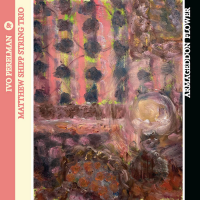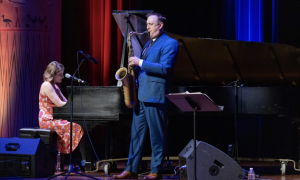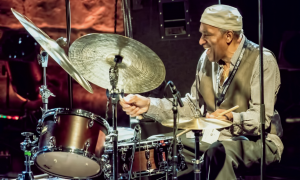Home » Jazz Articles » Catching Up With » Will Bernard Finds His Own Path To Jazz Career
Will Bernard Finds His Own Path To Jazz Career
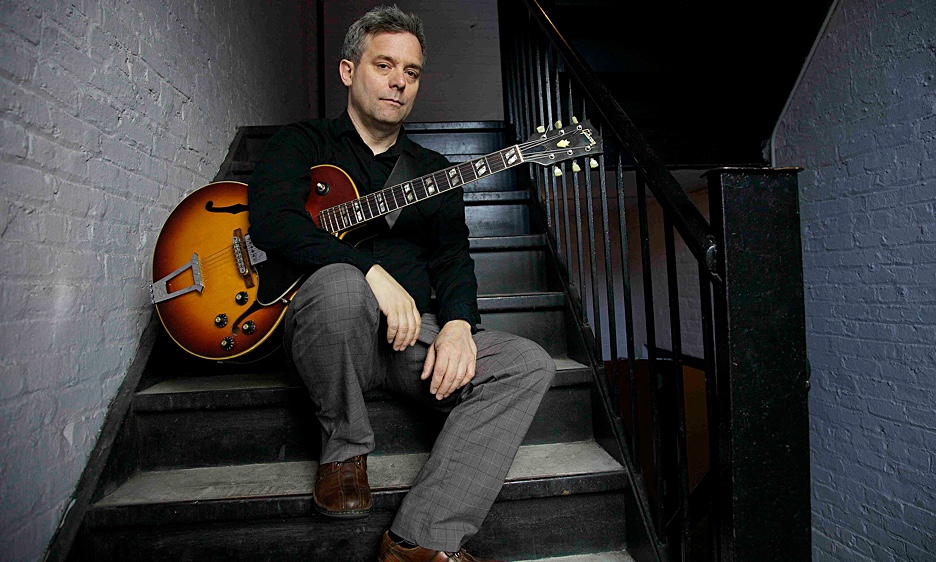
There are a lot of different variations of being involved in a group, either as a complete side person or a more collaborative situation, or being the leader - and there are good things about all of those positions you can be in.
—Will Bernard
Will Bernard
guitarHe says this occurred to him when he was being asked to play on some recording sessions in New York.
"In New York, I've been doing some recording—I did three records for PosiTone, which is more of a jazz label. They're actually based in L.A., but they record mostly in New York. He was calling me in to do jazz sessions, and I think, 'I'm not the regular jazz player.' I come from a lot of different places—it's like a challenge for me, to play with these guys who that's what they do: They go to the jazz schools, they're trained in that way. I didn't go to Berklee College of Music or New School. My early jazz training was people like
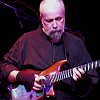
Dave Creamer
guitar"I feel like in a way I've developed my own style, just from the way I've gone about it. A little bit of this and a little bit of that."
Growing up, Bernard's first musical memories are of folk music.
"I was an only child. I grew up in the fertile era of the '60s in Berkeley [California]. My parents used to have dinner parties, and it was the folk era, so they'd bring out guitars and sing folk music. Those would be my earliest memories."
But classical—and then rock—would soon make their way into his musical landscape as well.
"They got divorced early, and piano was her way of getting away from it all. She studied classical piano—and I really liked the Bartok when I was 5 years old and she was playing it. Peasant songs, folk songs. I think there are certain harmonies, and I liked bluesy-sounding things from an early age, a certain dissonance.
"

Peter Apfelbaum
saxophoneb.1960
"I started taking piano when I was about 8, a private teacher. Then I started taking guitar at age 10, and that stuck. I was liking rock, I just wanted to play rock guitar. Then it took me awhile to get into jazz."
Bernard said the first record he ever bought on his own was classical: "Schubert, by the Trio Stern/Rose/Istomi. The second was Meet the Beatles."
His earliest repertoire was neither classical nor rock, however.
"I learned a lot of folk songs, I remember 'The Rock Island Line,' 'Nobody Knows You When You're Down and Out'—songs like that I liked, folk songs that had some blues and jazz elements to them.
"In the mid-'70s, there was a big fusion thing that got me into jazz—Mahavishnu,

Weather Report
band / ensemble / orchestra
Chick Corea
piano1941 - 2021

Frank Zappa
guitar, electric1940 - 1993
While Bernard says he wasn't yet informed enough at the time to fully appreciate Creamer's reputation, he was aware that his guitar teacher was pretty special.
"I knew Dave was a great, incredible musician, and a great teacher. And later, I heard

George Benson
guitarb.1943

Miles Davis
trumpet1926 - 1991
"He wasn't doing it like

Frank Gambale
guitarb.1958
Bernard said that even though he was still a teenager and just finding his way on guitar, he was able to comprehend much of what Creamer was showing him.
"I was getting it! I wasn't able to incorporate it into my playing at all at once, but I understood the meaning of it."
It was when he was about 14 that he first began earning money with his guitar.
"I was in a band, we'd play different little places. An electric band, called Scream. We'd play at this club called Ashkenaz in Berkeley; it's still there. It started out as an Israeli folk dance club. Somehow I managed to get us gigs, and all the kids would come down.
"It was a place where a lot of world music came though—a lot of reggae, a lot of African bands."
Bernard's band, Scream, however, stuck to the rock basics of the time: "Allman Brothers, Zeppelin, Stones, stuff like that."
After finishing his university studies, Bernard said he was trying to figure out what came next.
"I didn't want more school, and I just started playing in wedding bands and stuff like that. Which paid more than the record store gig that I had at the same time.
"In the mid-'80s I started playing in

Peter Apfelbaum
saxophoneb.1960
"[Trumpeter]

Steven Bernstein
trumpetb.1961
"Peter stayed in Berkeley. He had this 16-piece group. Then he got signed. First we did a record with

Don Cherry
trumpet1936 - 1995
"Hans Wendl and Lee Townsend were these two producers / managers who moved here from New York and had been working with

Bill Frisell
guitar, electricb.1951

T.J. Kirk
band / ensemble / orchestraT.J. Kirk was a three-headed monster of Bernard,

John Schott
guitar
Charlie Hunter
guitarb.1967

Scott Amendola
drumsb.1969
"Everybody was hot on Charlie Hunter right then—it was like the acid jazz thing. He was a Berkeley guy, too. He had the seven-string guitar—two pickups, the lower strings on a bass amp, and the higher strings on a guitar amp.
"It was kind of a main project for me and John Schott, but it was kind of a side project for Charlie, even though it was on Warner Brothers. He got signed to Blue Note at the same time. But it opened up doors—I got my first deal through that, on Antilles, which was part of the Verve Group.
"That was kind of the time that

Robert Walter
organ, Hammond B3
Stanton Moore
drumsb.1972

Galactic
band / ensemble / orchestrab.1994
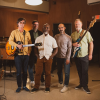
Greyboy Allstars
band / ensemble / orchestra"I was coming from a little bit different place than those guys. I'd already gone through classical music school, and had this weird band with T.J. Kirk doing

Thelonious Monk
piano1917 - 1982
"I had various groups I was leading, and I can't remember when I first started playing with Robert, but I remember Charlie and Stanton had the same manager, and he put together this benefit with

Les Claypool
bassb.1963
"We'd go down to New Orleans a lot. One year, I sat in with Galactic at the Mountain Air Festival. Stanton knew about T.J. Kirk. Basically the Stanton Moore Trio came out of that. Stanton wanted to hone it down to a trio. He said, 'I want to do three records with this group'—he had it all planned out in his head. And that's exactly what we did!"
About 15 years ago, Bernard belatedly followed some of his earliest musical cohorts in making the move to New York City— but also keeps a place in Berkeley (where he was during this Zoom interview).
"I'm more or less bi-coastal. It took me a long time to move out there—a lot of my friends had moved out earlier.

Todd Sickafoose
bass, acousticBernard has been on a tear as leader of late, releasing Freelance Subversives in 2020, Ancient Grains last year, and most recently, Pond Life in May, with drummer

Ches Smith
drums
Chris Lightcap
bassb.1971

Tim Berne
saxophone, altob.1954

John Medeski
organ, Hammond B3b.1965
"This album we had recorded before the pandemic. It was a direction I wanted to explore more, as I'd done a record with Ches Smith in 2004, called Directions To My House. We were both living in Berkeley at that time, and we'd developed a rapport. He has an interesting way of interpreting my music, he brings certain things out in my playing. So I've always wanted to do another one with him. I just went in and did the songs that were written especially for this group."
This new record also represented another new direction for Bernard: Self-releasing it.
"I paid for this out of my pocket. I was on many labels, and basically not getting any money back after the original advance, and mechanicals and publishing. They paid for it, and did the publicity and everything, so now a lot of us are doing it on our own."
But Bernard said self-releasing has its own challenges, in that without a label to support you, you're left doing your own publicity, order fulfillment, etc.
"Most of us just want to play music and not have to have ten jobs."
Bernard said he already has ideas for another three or four albums, but also enjoys staying involved in playing with and for other musicians on their projects as well.
"There are a lot of different variations of being involved in a group, either as a complete side person or a more collaborative situation, or being the leader—and there are good things about all of those positions you can be in. I like to to be able to experience them all if possible. Sometimes it's nice to just be a sideman, and just go in and play and do your best to bring out whatever music you're playing. That's the only responsibility—you don't have to do anything else.
"This group we have, Mad Skillet, with John Medeski, that's a collaborative group. It's very refreshing, because everybody has input.
"Being a leader is a lot harder. You have to do everything. But there's a reward from being able to have a vision, and flesh it out.. You have to find the right people to play the music, find an audience."
Bernard said there is an art to putting together a band.
"I feel like I've gotten a lot better at this after being experienced. It's finding people who are like-minded, which is not always so easy. Living in New York, there's such a larger number of musicians to draw on , so I can find them easier there than I could here.
"For instance, I just did a tour with my band Freelance Subversives, the West Coast run, and I brought two guys from New York, and then got guys out here I'd played with a long time, who I knew could learn the music quickly. I feel like I've been playing a long time, and I know a lot of musicians I've been playing with for a long time whom I can pick and I know how they sound."
Tags
Catching Up With
Will Bernard
Jim Trageser
Dave Creamer
Peter Apfelbaum
Weather Report
Chick Corea
Frank Zappa
george benson
Miles Davis
Frank Gambale
Don Cherry
Bill Frisell
T.J. Kirk
John Schott
Charlie Hunter
Scott Amendola
Robert Walter
Stanton Moore
Galactic
Greyboy Allstars
Thelonious Monk
Roland Kirk
Les Claypool
Todd Sickafoose
Ches Smith
Chris Lightcap
Tim Berne
John Medeski
Comments
PREVIOUS / NEXT
Support All About Jazz
 All About Jazz has been a pillar of jazz since 1995, championing it as an art form and, more importantly, supporting the musicians who make it. Our enduring commitment has made "AAJ" one of the most culturally important websites of its kind, read by hundreds of thousands of fans, musicians and industry figures every month.
All About Jazz has been a pillar of jazz since 1995, championing it as an art form and, more importantly, supporting the musicians who make it. Our enduring commitment has made "AAJ" one of the most culturally important websites of its kind, read by hundreds of thousands of fans, musicians and industry figures every month.




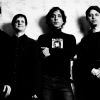

 Buy Now
Buy Now




